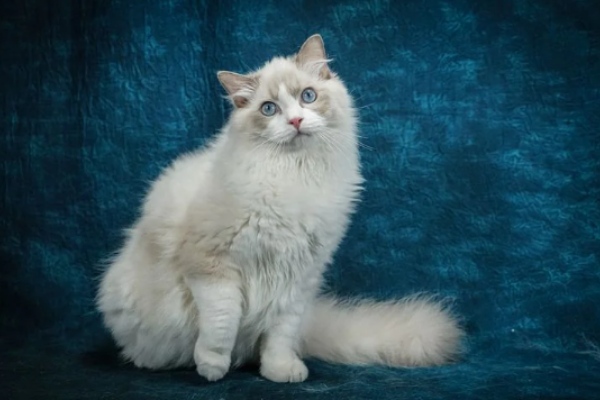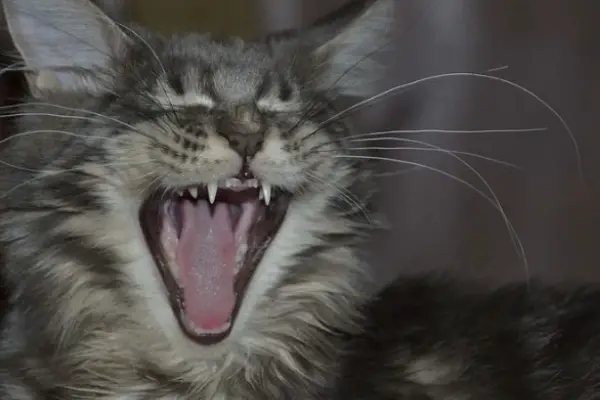How Long Do Ragdoll Cats Live: 10 Things To Consider

How long do ragdoll cats live is a common question among ragdoll owners, and that is what we will be discussing in this post.
Even though there is a set or average range of years a ragdoll can live, there are many factors that influence these years.
Such factors are what we will be discussing and also highlighting common ways to help a ragdoll live healthy, happy, and longer.
So keep reading…
How Long Do Ragdoll Cats Live
On average, a healthy ragdoll cat may live for 13 to 16 years or more with regular medical checkups, a good diet plan, and basic care all of which influence how long a ragdoll lives.
How long ragdoll cats lives are sometimes influenced by their owners even though they have a range.
Let’s look at some common factors that influence how long ragdoll cats live!
Factors that affect how long a ragdoll live
Here are some frequent factors that impact a ragdoll cat’s life expectancy:
1. Reproductive issues
When a ragdoll cat is neutered, he or she is more likely to enjoy a healthy and happy life, which might lead to a longer lifespan.
This is true because a non-neutered ragdoll cat has more hormonal changes than a neutered ragdoll cat.
By neutering a ragdoll cat, the reproductive drive will be addressed, and any difficulties linked with reproduction that may impact their life span will be prevented.
2. Breed issues
On average, purebred cats live longer than crossbred cats. They are more susceptible to infections as a result of many years of selective breeding.
A purebred ragdoll cat will live far longer than a mixed-breed ragdoll cat.
This is why you should always get your ragdoll cat from a reputable breeder with a history of producing healthy ragdoll cats.
3. Genetic issues
The ragdoll cat’s longevity, like that of other living species, is largely determined by genetics.
If the parents of a ragdoll cat live to be old, the kitten is likely to live to be old as well.
Unfortunately, diseases like heart disease and asthma, as well as genetics, may be passed on to kittens.
These illnesses, which are passed on from parents to their kittens, play a significant influence on the lifespan of ragdoll cats.
This is why we suggest purchasing a ragdoll cat from a reputable breeder or adopting one from a shelter.
4. Poor diet
A ragdoll cat’s life expectancy is influenced significantly by a poor diet.
This is why, in order to supply you with the proper nourishment, we recommend speaking with your veterinarian.
Keep in mind that the food you feed your ragdoll kitten differs from what you feed an adult or senior cat.
At every stage of life, it is essential to choose the proper sort of food, which should be prescribed by a certified veterinarian.
In reality, a bad diet causes unnecessary health problems in ragdoll cats, which may limit their lifespan.
5. Environmental conditions
Outside Siamese cats are at a higher danger than inside ragdoll cats.
There are various reasons why you should not let your ragdoll cat go around outside unattended.
The dangers they confront on the outside, including car accidents, pollution, diseases, and animal attacks, have an effect on their lifespan.
According to statistics, car accidents are the main cause of death among cats.
Allowing your cat to spend too much time outside might expose him or her to a variety of new dangers.
They might be attacked by dogs or other animals, ingest poison, or get other illnesses.
6. Chronic diseases
Ragdoll cats are known to have a number of health issues, most of which will have a direct impact on their lifespan.
The most prevalent health issue is progressive retinal atrophy, urinary tract infections, Polycystic Kidney Disease, and more.
GI and neoplastic difficulties, urinary tract illness, and gum disease are just a few of the health problems that this breed has to deal with.
7. Health care issues
The health of a ragdoll cat is vitally crucial. If you don’t address a minor injury, it might become a much bigger issue.
Because ragdoll cats who spend most of their time outside are rarely in close contact with humans, health issues may go undiscovered or develop before they are identified.
Even a flea or tick infection may be life-threatening for ragdoll cats if left untreated.
It’s not just a matter of keeping ragdoll cats clean and well-groomed to avoid mats, loose hair, and foreign objects becoming stuck in the skin or paws; it’s also a simple matter of keeping them clean and well-groomed.
8. Stress, anxiety, and depression level
Cats have a lot of anxiety, and when stressed or depressed cats do not do well.
There are a variety of causes for this, including loud noises, other animals, humans they dislike, and so on.
While it may not be practical to take your cat to areas that are completely stress-free, you can teach them to manage their fear.
Give them toys, make sure they receive enough sleep and be there in circumstances that are likely to cause them to worry.
Positive hormones are released when people are happy or tranquil, and these hormones help people live longer.
9. Indoor vs outdoor issues
Indoor ragdoll cats live longer than outdoor ragdoll cats, this is because they are well cared for.
There are lots of dangers associated with outdoor ragdoll cats one of which is that they are not good hunters.
If you keep an outdoor ragdoll you can expect to see more diseases which means they will live shorter than an indoor ragdoll cat.
10. Absence of medical check-ups
When Ragdoll cats are sick, they are unable to communicate.
Ragdoll cats, on the other hand, are known for keeping their negative feelings to themselves.
When an owner detects something is wrong with their ragdoll cat, it is sometimes too late to assist them.
Ragdoll cats, in particular, need to see a veterinarian on a regular basis.
This provides you the best chance of spotting any problems early enough to properly solve them.
Ensure that your ragdoll has had all of the required vaccines and is up to date.
Make your pet’s annual checkups a priority. This aids in the early diagnosis of possible problems and the provision of preventative treatment.
How to help a ragdoll cat live longer
Here are some typical methods for extending the life of a ragdoll cat:
1. Avoid dehydration
Dehydration can shorten your ragdoll cat’s lifespan by causing unwanted health problems.
Make sure your ragdoll cat has access to a clean water fountain by placing it where he or she can see it.
2. Avoid depression, stress, and anxiety
Ragdoll cats are friendly creatures who like spending time with their owners.
Ragdoll cats, on the other hand, might get depressed if left alone for long periods of time.
Stress and sorrow may quickly decrease the lifespan of your ragdoll cat.
As a result, by following these easy methods, you may be able to extend the life of your ragdoll cat.
Always remember to love and care for your pets in order to keep them happy and active.
By giving your ragdoll cat proper care and attention, you may help them live longer.
3. Avoid certain human foods
Owners of Ragdoll cats often feed their cats from their own plates without even realizing it.
Though it’s a thoughtful gesture, not all foods are appropriate for your ragdoll cat.
Excessive consumption of human food may create gastric problems in your ragdoll cat and shorten its lifespan.
Follow the food plan that a trained veterinarian has provided you in the letter.
Groom your ragdoll cat on a regular basis and provide them with a balanced diet.
If you notice your cat has a health condition, address it as quickly as possible.
4. Keep ragdoll cats indoors
Ragdoll cats have unique characteristics, and we know that they like exploring new places.
Allow your ragdoll to go outside only under your watch, to your backyard, porch, or front garden.
Ragdoll cats like playing outside. Your cat, on the other hand, is always at risk of being attacked by stray or other animals.
It’s possible that your ragdoll cat will consume something dangerous or get a disease.
As a result, it’s best to keep your ragdoll cat indoors, and if it must be outside, make sure it’s supervised.
5. Provide high-quality cat food
Giving ragdoll cats high-quality food is a simple way to help them live longer lives.
Poor nutrition is one of the primary causes of health issues in cats, therefore feeding your ragdoll cat nutritious food is crucial.
Ascertain that they consume a high-protein, vitamin- and mineral-rich diet.
Because both dry and wet food are nutritious, you may give your ragdoll cat both.
6. Watch out for sick symptoms
Ragdoll cats are susceptible to a number of diseases, many of which exhibit early warning signals. Ragdolls, for example, are prone to hip dysplasia.
Jumping apprehension, limping, and other symptoms are all prevalent.
So, if your ragdoll cat begins to act abnormally, take him to the veterinarian straight soon.
Keeping a watch on your unwell symptoms can aid you in identifying any potential dangers.
7. Buy from a reputable breeder
You will avoid unnecessary health challenges if you get a purebred ragdoll from a reputable breeder.
This can help you get a healthy ragdoll that will live longer than expected.
Don’t go for a breeder that has not been involved in breeding for long and people can trust his or her breeding process.
8. Schedule regular medical check-ups
Ensure that your ragdoll has had all of the required vaccines and is up to date.
Make your pet’s annual checkups a priority.
This aids in the early diagnosis of possible problems and the provision of preventative treatment.
The best approach to stay informed about your ragdoll cat’s health is to take her to the veterinarian for regular checks.
Early detection of any health issues will help your ragdoll enjoy a longer life.
I hope the information provided on this page answers your question about how long do ragdoll cats live.


![Are Bengal Cats Aggressive [11 Aggression Triggers] Are Bengal Cats Aggressive](https://petcreeks.com/wp-content/uploads/2023/05/Are-Bengal-Cats-Aggressive-768x555.jpg)
![Do French Bulldogs Bite [10 Bite Triggers] Do French Bulldogs Bite](https://petcreeks.com/wp-content/uploads/2021/07/Do-French-Bulldogs-Bite-768x644.jpg)
![Will Beagles Return Home If Lost [Answered] Will Beagles Return Home](https://petcreeks.com/wp-content/uploads/2021/04/beagle-5964194_640.jpg)

